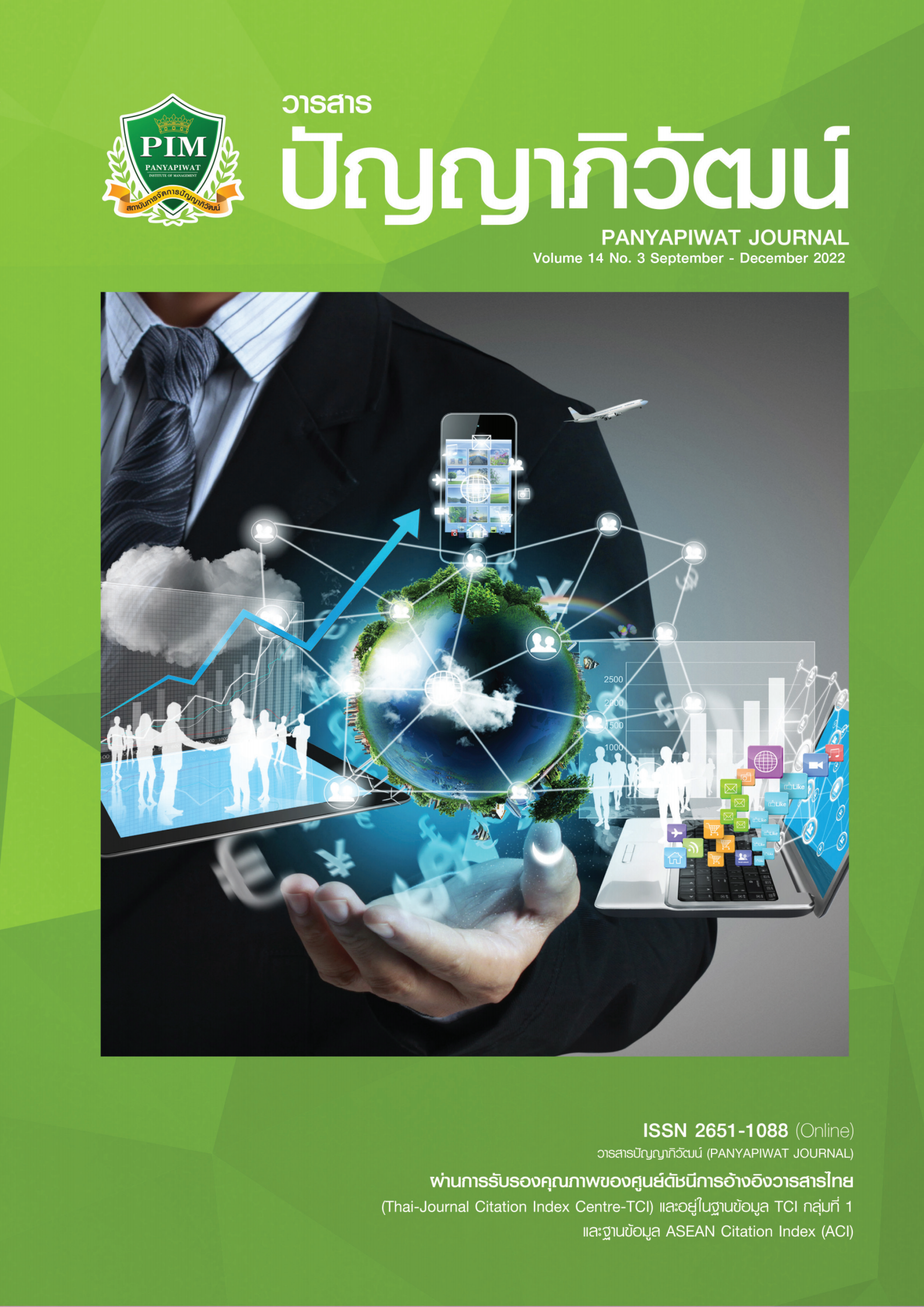ความต้องการของผู้ปกครองสำหรับโปรแกรมเสริมพิเศษของผู้เรียนเจเนอเรชันอัลฟา: โรงเรียนเอกชนในพื้นที่ศูนย์กลางทางเศรษฐกิจภาคใต้ตอนล่างของไทย
Main Article Content
บทคัดย่อ
การวิจัยครั้งนี้เป็นการวิจัยผสานวิธีเพื่อวิเคราะห์ความต้องการของผู้ปกครองสำหรับโปรแกรมเสริมพิเศษสำหรับพัฒนาผู้เรียนเจเนอเรชันอัลฟา: โรงเรียนเอกชนในพื้นที่ศูนย์กลางทางเศรษฐกิจภาคใต้ตอนล่างของไทย กลุ่มตัวอย่างที่ใช้ในการศึกษาเชิงปริมาณ คือ ผู้ปกครองนักเรียนระดับอนุบาลถึงระดับประถมศึกษา โรงเรียนเอกชนแห่งหนึ่งในอำเภอหาดใหญ่ จังหวัดสงขลา จำนวน 264 คน โดยวิธีการสุ่มแบบชั้นภูมิ เครื่องมือที่ใช้ในการวิจัย คือ แบบสอบถาม มีค่า IOC รายข้อระหว่าง .67-1.00 และค่าความเชื่อมั่นทั้งฉบับเท่ากับ .92 สถิติที่ใช้ในการวิเคราะห์ข้อมูลเชิงปริมาณ ได้แก่ ค่าความถี่และค่าร้อยละ ผลการวิจัยพบว่า โปรแกรมเสริมพิเศษที่ได้รับความต้องการสูงสุด 3 อันดับแรก ได้แก่ 1) โปรแกรมหุ่นยนต์จากพื้นที่การเรียนรู้ด้านวิทยาศาสตร์เทคโนโลยี คิดเป็นร้อยละ 43.26 ซึ่งมีช่วงราคาสูงที่สุด 2) โปรแกรดนตรีสากลจากพื้นที่การเรียนรู้ด้านศิลปะร่วมสมัย คิดเป็นร้อยละ 27.19 และ 3) โปรแกรมภาษาอังกฤษจากพื้นที่การเรียนรู้ด้านติวเข้มวิชาการคิดเป็นร้อยละ 18.10 ทั้งนี้การวิจัยเชิงคุณภาพด้วยวิธีการวิจัยเชิงชาติพันธุ์วรรณนาที่ผู้วิจัยฝังตัวศึกษา ในพื้นที่ระยะเวลา 5 เดือน ผู้ให้ข้อมูลสำคัญ จำนวน 14 คน จากการวิเคราะห์เนื้อหาพบว่า ความต้องการของผู้ปกครองส่วนใหญ่มีฐานคิดมาจากการคิดแบบมุ่งความสำเร็จผสานกับการคิดแบบสัจนิยมในการตัดสินใจเลือกโปรแกรมเสริมพิเศษให้กับผู้เรียนเจเนอเรชันอัลฟา
Article Details

อนุญาตภายใต้เงื่อนไข Creative Commons Attribution-NonCommercial-NoDerivatives 4.0 International License.
“ข้าพเจ้าและผู้เขียนร่วม (ถ้ามี) ขอรับรองว่า บทความที่เสนอมานี้ยังไม่เคยได้รับการตีพิมพ์และไม่ได้อยู่ระหว่างกระบวนการพิจารณาลงตีพิมพ์ในวารสารหรือแหล่งเผยแพร่อื่นใด ข้าพเจ้าและผู้เขียนร่วมยอมรับหลักเกณฑ์การพิจารณาต้นฉบับ ทั้งยินยอมให้กองบรรณาธิการมีสิทธิ์พิจารณาและตรวจแก้ต้นฉบับได้ตามที่เห็นสมควร พร้อมนี้ขอมอบลิขสิทธิ์บทความที่ได้รับการตีพิมพ์ให้แก่สถาบันการจัดการปัญญาภิวัฒน์หากมีการฟ้องร้องเรื่องการละเมิดลิขสิทธิ์เกี่ยวกับภาพ กราฟ ข้อความส่วนใดส่วนหนึ่งและ/หรือข้อคิดเห็นที่ปรากฏในบทความข้าพเจ้าและผู้เขียนร่วมยินยอมรับผิดชอบแต่เพียงฝ่ายเดียว”
เอกสารอ้างอิง
Areekul, C. (2019). Alternative education: The important learning model for generation alpha. Journal of MCU Social Science Review, 8(3), 270-283.
Fredricks, J. A. (2011). Extracurricular participation and academic outcomes: Testing the over scheduling hypothesis. Journal of Youth and Adolescence, 41(3), 295-307. http//doi.org/10.1007/s10964-011-9704-0
Kenneth, R. B., Nemelka, B., Nemelka, M., & Gardner, P. (2012). Clarifying the meaning of extracurricular activity: A literature review of definitions. American Journal of Business Education, 5(6), 693-704.
Knifesend, C. A., & Graham, S. (2012). Too much of a good thing? How breadth of extracurricular participation relates to school-related effect and academic outcomes during adolescence. Journal of Youth and Adolescence, 41(3), 379-389. http//doi.org/10.1007/s10964-011- 9737-4
Lou, R. (2020). Industry ecology and development trend of K12 extra-curriculum training in China’s education industry. Advanced in Social Science, Education and Humanities Research, 412, 246-251.
Metsapelto, R. L., & Pulkkinen, L. (2011). Socioemotional behavior and school achievement in relation to extracurricular activity participation in middle childhood. Scandinavian Journal of Educational Research, 56(2), 167-182. http//doi.org/10.1080/00313831.2011.581681
Namkhun, S., Teeassana, P., & Sarapak, W. (2019). Research and development of robotics kit to enhance the learning of computational thinking systematically. Faculty of Engineer, Faculty of Information Technology Rajabhat Maha Sarakham University.
Office of Private Education Commission. (2020). Statistics of private education in 2562 (B.E.). https://www.drive.google.com/field/d/1Cs8AvT_ pncAYzqcS00eAPSYKyy00gumm/view [in Thai]
Office of the National Economic and Social Development Council. (2019). Report of the impact of demographic transitions in Thailand and the policy recommendations for development through population estimate in Thailand. NESDC. [in Thai]
Pasquarelli, A., & Schultz, E. J. (2019). Move over Gen Z, Generation alpha is the one to watch. http://adage.com/article/cmo-strategy/move-gen-z-generation-alpha-watch/316314
Post up News. (2019). HP identifies parental focus on preparing children future ready. https://en.postupnews.com/2019/07/hp-new-asian-learning-experience.html
Rose, D., Bartoli, A. J., & Heaton, P. (2019). Measuring the impact of musical learning on cognitive, behavioral, and socio-emotional wellbeing development in children. Psychology of Music, 47(2), 284-303. https://doi.org/10.1177/030573 5617744887
Singh, L., Tan, A. R. Y., Lee, K., & Quinn, P. C. (2020). Sensitivity to race in language comprehension in monolingual and bilingual infants. Journal of Experimental Child Psychology, 199, 104933. http//doi.org/10.1016/j.jecp.2020.104933
Sutjanant, J. (2013). Education and community development in the 21st century. Odean Store.
Tantichoowet, P. (2017). New generation of 21st century in Thai society. Chulalongkorn University Press.
Veltz, P., & Shakib, S. (2013). Interscholastic sports participation and school based delinquency: Does participation in sport foster a positive high school environment? Sociological Spectrum: Mid-South Sociological Association, 32(6), 558-580. http//doi.org/10.1080/2732173.2012.700837
Vincent, K., & Asiimwe, A. (2020). Extra-curricular activities as predictors of primary school pupils’ academic self-efficacy in Kira Municipality, Wakiso District, Uganda. International Journal of Research and Innovation in Social Science (IJRISS), 4(1), 220-226.
Wormington, S. V., Henderlong Corpus, J., & Anderson, K. G. (2012). A Person-centered investigation of academic motivation and its correlates in high school. Learning and Individual Differences, 22(4), 429-438. http//doi.org/10.1016/j.lindif.2012.03.004


